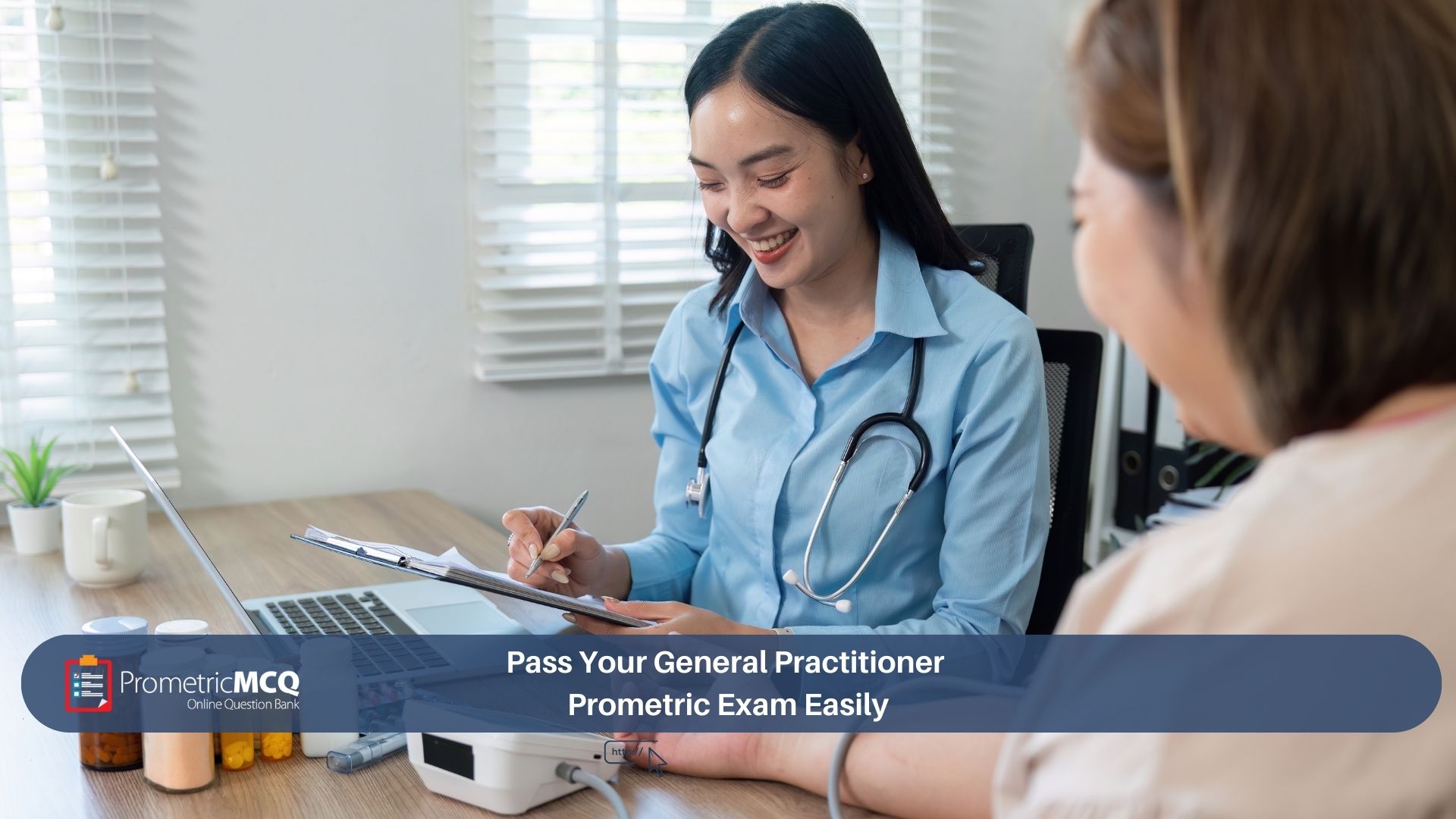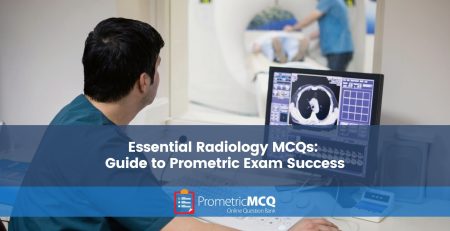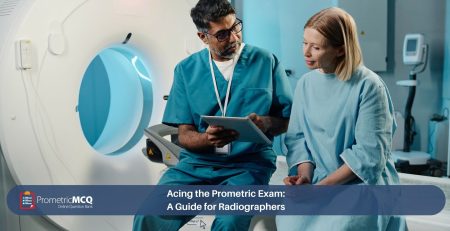
Pass Your General Practitioner Prometric Exam Easily
fatima@prometricmcq.com2025-09-27T00:38:01+00:00Table of Contents
TogglePass Your General Practitioner Prometric Exam Easily (2025)
For General Practitioners (GPs) worldwide, the prospect of working in the advanced, dynamic healthcare systems of the Gulf region is a major career goal. The journey to obtaining a license in countries like the UAE, Saudi Arabia, Qatar, Bahrain, Kuwait, or Oman is paved with a critical milestone: the Prometric licensing exam. The very mention of this exam—whether it’s the DHA, MOH, SCFHS (SMLE), QCHP, NHRA, or KMLE—can evoke feelings of anxiety due to its vast syllabus and high stakes. However, the word “easily” is not a fantasy; it’s the outcome of a smart, strategic, and efficient preparation process.
Passing the GP Prometric exam is not about possessing a photographic memory or studying 18 hours a day. It is a test of clinical reasoning, pattern recognition, and the ability to apply evidence-based principles under pressure. The candidates who pass “easily” are those who replace brute-force memorization with a sophisticated strategy. They understand the exam’s pattern, focus on high-yield content, and master the art of deconstructing Multiple-Choice Questions (MCQs). They work smarter, not just harder.
This ultimate 2025 guide is your blueprint to adopt that winning strategy. We will demystify the exam, providing a universal framework that applies to all Gulf health authorities. We’ll dive deep into the high-yield topics that form the core of the GP syllabus, offer a proven study plan, and provide realistic sample questions with detailed rationales. Complemented by a robust 10-point FAQ section, this guide will transform your perception of the exam from an insurmountable obstacle into a manageable and conquerable challenge.
Key Takeaways for an “Easy” Pass
- Strategy Trumps Memorization: A structured study plan focused on high-yield topics is more effective than trying to learn everything.
- Internal Medicine is the Foundation: Master the core topics of internal medicine (Cardiology, Endocrinology, Pulmonology), as they form the bulk of the exam.
- Active Learning is Non-Negotiable: The most effective way to study is by solving thousands of MCQs from a high-quality question bank, not by passively reading.
- Know the “Next Best Step”: The exam tests clinical decision-making. The most common question format asks for the most appropriate next step in management.
- Simulate the Real Exam: Regular, timed mock exams are essential to build the stamina and pacing needed to complete the test comfortably.
The Universal Blueprint: Deconstructing the GP Prometric Exam
While each health authority has its own name—DHA, MOH, SCFHS, etc.—the exam they administer through Prometric shares a common DNA.
Core Exam Framework
- Format: All are Computer-Based Tests (CBTs) comprised entirely of MCQs.
- Structure: Most GP exams consist of 150 MCQs to be completed in 3 hours (180 minutes).
- Scoring: The outcome is a simple Pass/Fail. The unofficial passing score is consistently estimated to be around 60-65%. There is no negative marking, so a guess is always better than a blank.
- Question Style: The vast majority of questions are clinical vignettes, presenting a patient case and asking you to make a decision about diagnosis or management.
The GP Syllabus: Focusing on What Truly Matters
The secret to an “easy” preparation is knowing where to focus your energy. The GP syllabus is broad, but the distribution of questions is not even. A strategic candidate masters the high-yield areas.
| Core Medical Domain | High-Yield Topics and Key Concepts for 2025 |
|---|---|
| Internal Medicine (The Core – ~50-60%) | This is where you win or lose the exam. Master these topics. Cardiology: Management of Hypertension (based on latest guidelines), Acute Coronary Syndrome (ACS), Heart Failure, and common arrhythmias. Endocrinology: Diagnosis and management of Diabetes Mellitus (Type 1 & 2), DKA/HHS, and Thyroid disorders (Hypo/Hyperthyroidism). Pulmonology: Management of Asthma and COPD exacerbations, and Community-Acquired Pneumonia. Gastroenterology: PUD, GERD, and Viral Hepatitis. |
| Pediatrics (~15-20%) | Focus on the common presentations in a GP clinic. Management of common infectious diseases (AOM, pharyngitis, bronchiolitis), understanding developmental milestones, the routine vaccination schedule, and management of dehydration in children. |
| Obstetrics & Gynecology (~10-15%) | Essentials of antenatal care and screening, diagnosis and initial management of common pregnancy complications (gestational diabetes, pre-eclampsia), and approach to common gynecological issues like abnormal uterine bleeding and PCOS. |
| Emergency Medicine & General Surgery (~10%) | Recognition and initial stabilization of life-threatening emergencies (Sepsis, Anaphylaxis, ACS). The initial approach to the acute abdomen (appendicitis, cholecystitis) and basic trauma assessment (ABCDE approach). |
| Psychiatry, Dermatology & Other Specialties (~5-10%) | Focus on the conditions most frequently seen in primary care. Diagnosis and first-line management of Depression and Anxiety disorders. Recognition of common skin conditions like Eczema, Psoriasis, and common bacterial/fungal skin infections. |
The “Easy Pass” Strategy: A 3-Phase Study Plan
A structured plan removes chaos and ensures comprehensive coverage of high-yield topics.
Phase 1: Foundational Review (2-3 Weeks)
Quickly review the core concepts of the major domains listed above. Use a concise review book (like the Oxford Handbook of Clinical Medicine) rather than a dense textbook. The goal is to refresh your memory, not to become a sub-specialist.
Phase 2: The Core Engine – Intensive MCQ Practice (6-8 Weeks)
This is the most important phase. Your primary study tool should now be a high-quality question bank. A comprehensive resource like the General Practitioner MCQs bank is essential.
- Work System-by-System: Dedicate a block of days to each system (e.g., 5 days for Cardiology, 5 for Endocrinology).
- Solve, Review, Repeat: Solve timed blocks of 40-50 questions. Then, spend twice as much time reviewing the rationales. Understand why the correct answer is right and, more importantly, why the incorrect options are wrong.
- Create a “Mistake Journal”: For every question you get wrong, write down the core concept you misunderstood. Review this journal weekly.
Phase 3: Integration and Simulation (2-3 Weeks)
Shift from system-wise blocks to random, mixed blocks of questions to simulate the real exam. In the final two weeks, take at least 3-4 full-length, 150-question, 3-hour mock exams under strict, timed conditions. This builds the mental stamina and pacing you need for exam day.
Sample Prometric GP Questions with Strategic Rationales
Let’s see this strategy in action. These questions reflect the clinical reasoning you’ll be tested on.
Question 1: Internal Medicine (Cardiology)
A 60-year-old male with a 10-year history of type 2 diabetes and a 20-pack-year smoking history presents for a routine check-up. He is asymptomatic. His blood pressure today is 155/95 mmHg. A reading taken last week was similar. According to the 2024 international guidelines, what is the most appropriate initial management?
- Start hydrochlorothiazide
- Start lisinopril
- Recommend lifestyle modifications only for 3 months
- Start amlodipine and lisinopril
Correct Answer: D (Start amlodipine and lisinopril)
Rationale: This question tests your knowledge of the latest hypertension guidelines (such as those from the American College of Cardiology – ACC). For a patient with Stage 2 Hypertension (≥140/90 mmHg), and who is more than 20/10 mmHg above their target goal (which is typically <130/80 mmHg for a patient with diabetes), initiating therapy with two first-line agents from different classes is now recommended. A combination of a DHP Calcium Channel Blocker (amlodipine) and an ACE Inhibitor (lisinopril) is a highly effective and guideline-recommended initial strategy. Lifestyle modifications should be advised concurrently but are not sufficient alone at this stage.
Question 2: Emergency Medicine
A 25-year-old female is brought to the emergency department after being stung by a bee. She is anxious, complains of difficulty breathing, and has diffuse urticaria. Her blood pressure is 80/50 mmHg and her heart rate is 130 bpm. What is the single most important immediate intervention?
- Administer intravenous diphenhydramine
- Establish IV access and start a normal saline bolus
- Administer intramuscular epinephrine
- Administer nebulized albuterol
Correct Answer: C (Administer intramuscular epinephrine)
Rationale: This is a classic presentation of anaphylaxis, a life-threatening, systemic allergic reaction. The patient has involvement of two systems (skin – urticaria; respiratory – difficulty breathing) and hypotension. The first-line, life-saving treatment for anaphylaxis is immediate administration of intramuscular epinephrine. Epinephrine reverses vasodilation (improving blood pressure), reduces mucosal edema (improving breathing), and reverses bronchoconstriction. All other interventions are secondary.
Frequently Asked Questions (FAQs) for the GP Prometric Exam
No, each country’s health authority (DHA, MOH, SCFHS, etc.) has its own version of the General Practitioner exam. However, they are all administered by Prometric and share a very similar format, syllabus, and difficulty level, making the preparation strategy universal.
For a candidate with a solid medical foundation, a dedicated and strategic 3-4 month period is generally sufficient. This allows for a quick review followed by an intensive phase of question-based practice and mock exams.
The best QBank is one that is comprehensive, regularly updated with the latest guidelines, features a large number of case-based questions, and provides detailed, evidence-based rationales. A platform that allows you to create timed and system-wise tests is crucial for effective Prometric exam preparation.
No, all Prometric exams for healthcare professionals use only generic (non-proprietary) drug names. You must be comfortable with names like “metformin” and “atorvastatin.”
Yes. Prometric has a global network of test centers. Once you receive your eligibility from the respective health authority, you can book your exam at a Prometric center in your home country or any other convenient location.
PSV is a mandatory background check of your professional credentials (medical degree, license, experience certificates) that is required by all Gulf health authorities before they issue a license. It is a separate process from the exam and should be started early to avoid delays.
Most authorities allow three attempts to pass the exam. There is usually a waiting period between attempts. A failure should be seen as a sign that your preparation strategy needs a fundamental change, likely with a much stronger focus on active learning with MCQs.
Poor time management. The exam is a race against the clock. Candidates who don’t practice under timed conditions often get bogged down on difficult questions, leaving them with insufficient time to answer the easier questions at the end of the exam. This is why timed mock exams are not optional; they are essential.
Only change an answer if you have a concrete, logical reason to do so (e.g., you misread the question initially or another question jogged your memory). Do not change answers based on “a feeling” or self-doubt. Your first educated instinct is often correct.
The best way is to take advantage of the tutorial at the beginning of your Prometric exam and, more importantly, to use a QBank that has a simulated exam mode. These tools are designed to mimic the real interface and timing, which significantly reduces exam-day anxiety. Exploring the features of an online assessment tool can be very beneficial.
Conclusion: The “Easy” Path is the Smart Path
Passing your General Practitioner Prometric exam “easily” is not about luck; it’s about intelligent design. It’s about trading inefficient, passive learning for a dynamic, active, and question-centered strategy. By understanding the exam’s universal blueprint, focusing your efforts on the high-yield core of the syllabus, and committing to a disciplined regimen of MCQ practice and simulation, you can deconstruct this challenge into a series of manageable steps. Walk into the Prometric center not with anxiety, but with the quiet confidence of someone who has a proven plan for success.
Ready to Make Your Prometric Journey Easy?
Our comprehensive MCQ bank for General Practitioners is built on this "easy pass" philosophy. It provides thousands of high-yield clinical vignettes, detailed evidence-based rationales, and realistic exam simulations to ensure you are fully prepared to succeed.










